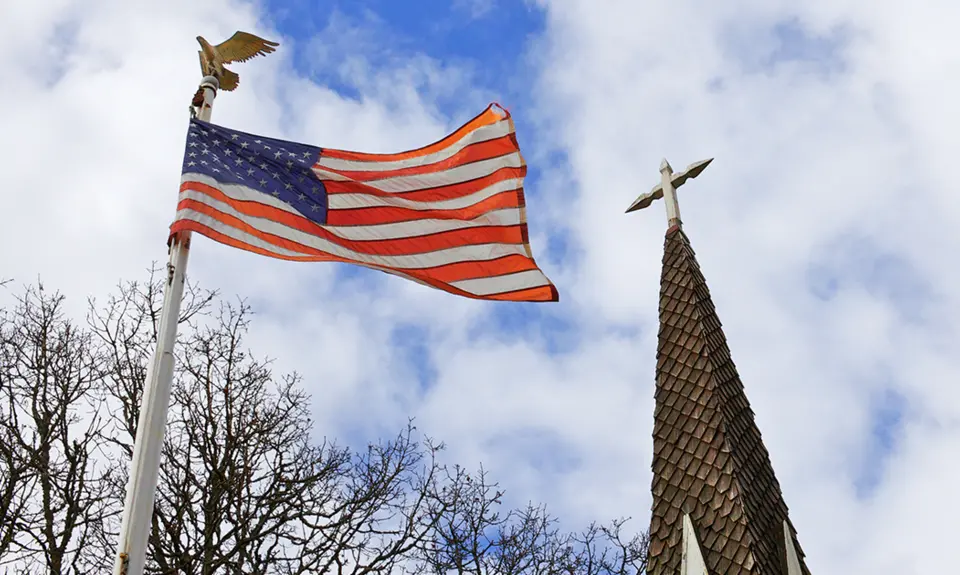This post first appeared on Medium.
You know the old saying, “The devil’s in the details,” right? Well, in the case of that big coronavirus legislation that just moved through Congress, the devil’s dressed up like a Trump-supporting megachurch preacher looking to stick his hand in Uncle Sam’s pocket.
I am shocked, I tell you, shocked, that the same right-wing evangelicals who treat small-government ideology as a biblical mandate, the same guys who preach that it’s not the government’s job to help the poor, who argue that Jesus would want people to pull themselves up by their own bootstraps, who even warned that too much help for suffering workers would make them lazy — those same conservative evangelicals lobbied the White House for a chance to fill their offering plates with tax dollars.
What am I talking about?
Last week Sen. Marco Rubio told the right-wing Florida Family Policy Council that the package he was putting together for Senate Republican leaders would let nonprofit organizations — including churches — get a loan from the government to cover four times their operating costs, including payroll, and that as long as the money went for those purposes, the loan would be forgiven.
The next day, on a call with hundreds of conservative preachers organized by the right-wing Family Research Council, President Donald Trump was on the line reminding conservative pastors that he’s given them everything they wanted and urging them to pray and work for his reelection.
Vice President Mike Pence was also on the call, and FRC President Tony Perkins pushed Pence to let those pastors hear from his own lips that the White House understood that following administration guidelines and cancelling religious services to save lives is costing churches money, and that they’d be taken care of in the legislation.
This strikes me as cynically transactional — a publicly funded payback for Trump’s most loyal defenders. They already bought into Trump’s let’s-make-a-deal politics, overlooking his moral corruption and ethical bankruptcy and working to get him elected in order to get the federal courts filled with right-wing judges.
I don’t know exactly how the Small Business Administration will implement the provisions in the bill. But I do know this: religious-right legal groups have been working for years to dismantle the separation of church and state, and this could be a powerful tool for smashing wide the holes they have already knocked in that wall.
Until recently, it would have been unquestionably unconstitutional to ask taxpayers to pay for clergy salaries. But the right-wing legal movement and the increasingly conservative federal judiciary have been chipping away at the principle that religious liberty is protected by preventing the government from officially promoting religion and subsidizing religious evangelizing. Their argument will be that if the government offers help to community-based nonprofit organizations, it has to offer the same help to churches — but they’ll insist that churches and religious nonprofits not be held to nondiscrimination standards that apply to other community-based nonprofits.
Now, let me be clear. I love the church. I’ve been a preacher my entire adult life. I am proud of the role that the black church plays in meeting the needs of our communities. And I support the ways that religiously affiliated nonprofits partner with the government to serve the people.
But I’m the kind of old-school Baptist who believes in the separation of church and state. I think having the government pay clergy salaries would be a terribly divisive idea, one that would generate anger and hostility toward communities of faith and harm the cause of religious freedom.
Our democratic values are most at risk in times of fear and crisis. Sometimes that threat is right in front of the TV cameras, and sometimes it’s buried deep in a bill too big to read. The separation of church and state protects my freedom as a preacher and it preserves genuine religious liberty for all Americans, of every faith and none. Even as we take extraordinary steps to protect one another during this crisis, we should remain vigilant that some will use the crisis to undermine the values we will need to thrive in the long run.
*Update: While Sen. Rubio proposed a loan program covering four times the operating costs of nonprofits, the legislation in its final form offers coverage for two-and-a-half times expenses.
This post first appeared on Medium.
